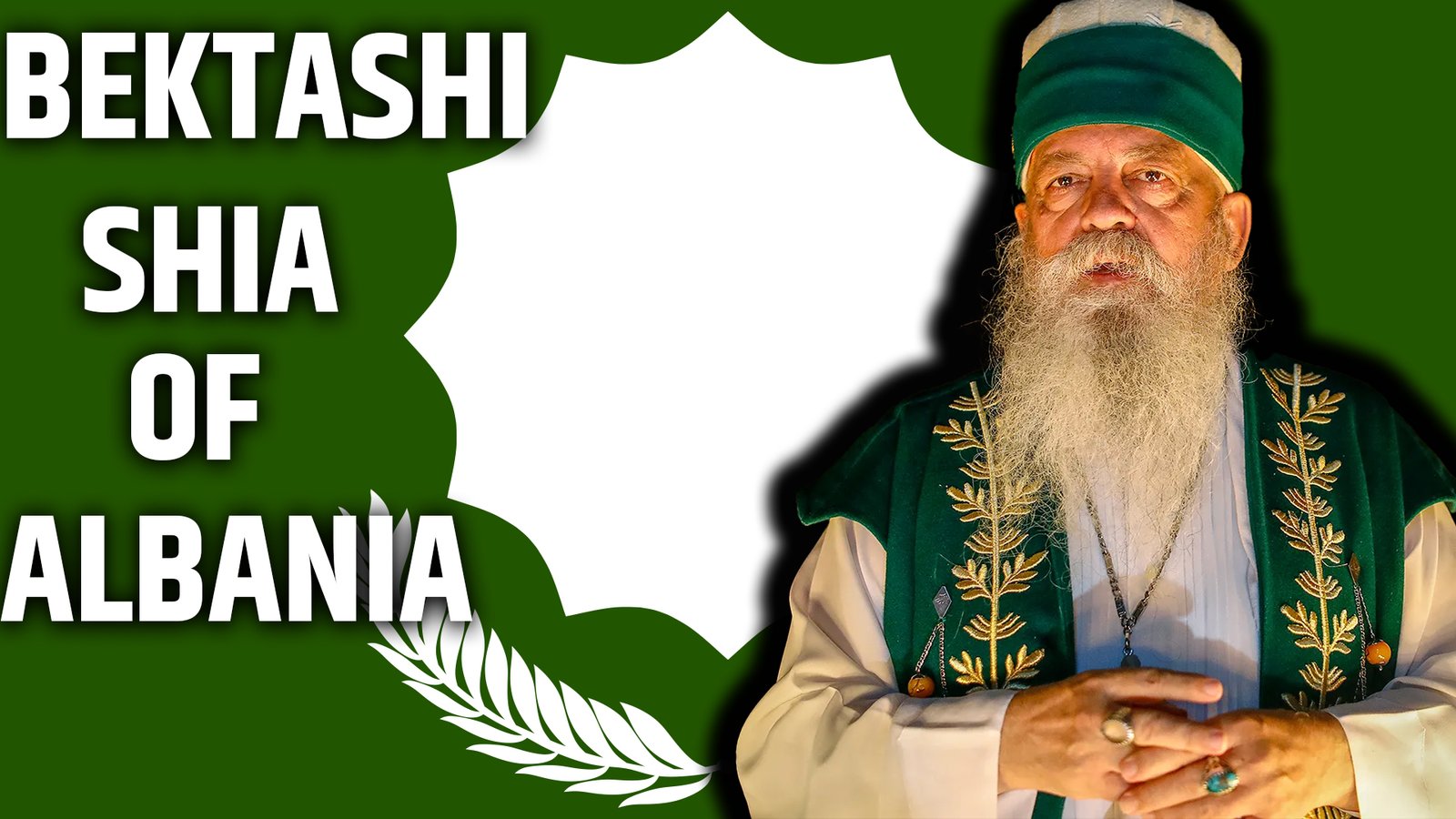Introduction
The Bektashi Shia are found in significant numbers in Albania, and their leader is named Baba Mondi. In 2024, the Albanian government announced that they are proposing to give the Bektashi minority their own autonomous government, similar to Vatican City. The Bektashi order is considered a branch of Shia Islam. Like the Twelver Shia, the Bektashis also believe in the twelve Imams. However, they follow a Sufi tradition, while the Twelvers do not follow Sufism. There are many other clear differences between these two Shia groups, which is why they maintain separate identities.
One of the unique practices of the Bektashis is that when followers, including both men and women, gather for religious worship, Sufi chanting (dhikr), or remembrance, they drink red wine as part of the ritual. Why do they do this? Let’s explore the history and beliefs of the Bektashis.
Founding Father
The founder of the Bektashi order was Haji Sayyid Muhammad Bektash Wali, who was born in 1201 AD in the city of Nishapur, Iran. He was a disciple of Sheikh Qutbuddin Haydar of the Malamati-Qalandari Sufi order, who belonged to the Twelver Shia tradition. Later, Haji Bektash Wali moved from Iran to Anatolia, a neighboring region of Turkey. There, he spread his teachings and converted local communities to Shia Sufi Islam. It is also said that he did not formally establish a Sufi order during his lifetime. However, after his death, a large number of his followers recognized him as their spiritual guide.
In the 16th century, a man named Balım Sultan, who was a follower of Haji Bektash Wali, laid the foundation for the formal structure of Sufism within this order. Balım Sultan introduced various methods of remembrance (dhikr) and certain beliefs. The order was then named Bektashi. Apart from the Bektashis, the Alevi Shia also consider Haji Bektash Wali their spiritual leader.
If you are interested to watch the documentary about Bektashi Order, please click here . . .
Bektashis and Janissaries
In the 15th century AD, the Ottoman Empire began recruiting soldiers from the followers of Haji Bektash Wali in Albania and the Balkans. Members of the Bektashi order eagerly joined the Ottoman army and showed remarkable performance in battles. The Ottoman Sultan formed a special unit of Bektashis called the Janissaries (Yeniçeri in Turkish, meaning “new soldiers” or “new army”). Due to their bravery and courage, this unit quickly became the Sultan’s most loyal force. Impressed by their valor, the Sultan himself joined the Janissaries as a soldier. Every three months, when the Janissaries received their salaries, the Sultan would stand in line and collect his pay as one of them. Seeing the Sultan among them boosted the morale of the Bektashi soldiers, making them even more devoted to him.

Initially, to keep these young soldiers focused on military campaigns, the Sultan banned them from marrying. However, later they were allowed to marry and given special privileges. Because of their military benefits and high status, they became part of the elite class in society. Their commander was called the Agha. The Janissaries are considered Europe’s first modern, organized army. By the 18th century, non-Bektashis, including Turks, also began joining the Janissaries. However, due to excessive privileges and growing power, the Janissaries started interfering in the affairs of the caliphate. In the 19th century, when Sultan Mahmud II introduced European-style reforms, the Janissaries rebelled. The Sultan crushed the rebellion harshly, killing many Bektashis and imprisoning the survivors. This marked the end of the Janissaries, the once-powerful military unit of the Ottoman Empire.
Migration to Albania
However, the common people of the Bektashi order continued their religious and social activities during this time. When the Ottoman Caliphate ended in 1925, Mustafa Kemal Atatürk banned all Sufi orders, forcing the Bektashis to migrate to nearby Albania. In 1967, when a communist government came to power in Albania, it banned all religious activities. Despite this, followers of the Bektashi order secretly practiced their faith. But in 1990, when a secular liberal government returned to Albania, people of all religions, including the Bektashis, were once again free to openly practice their beliefs. In 2025, this order gained global attention when it was offered the chance to establish its own autonomous state, similar to Vatican City.

Baba Mondi (Edmond Brahimaj), the current spiritual leader of the Bektashi Shia, was born in Albania in 1959. After completing his early education, he joined the Albanian army as an officer. In 1992, he left military service and became a dervish in the Bektashi Sufi order. He quickly rose through the ranks and, in 2011, became the eighth Dedebaba (head) of the order. The Dedebaba is considered the highest spiritual authority in the Bektashi tradition.
Beliefs
The Bektashi order is often called a heterodox religion because it incorporates not only Islamic practices but also elements from Christianity, Zoroastrianism, and other faiths. Their current leader, Baba Mondi, wears a cross around his neck with the words “Allah, Muhammad, and Ali” inscribed on its three points. This symbolizes the Bektashi belief in unity across religions. Unlike other Islamic sects, the Bektashi order considers alcohol (wine) permissible. They believe drinking wine reveals a person’s true inner self, exposing their real nature. That’s why they allow wine—in fact, before performing Sufi dhikr (remembrance of God), both men and women drink wine to reach a state of spiritual intoxication, then gather together for chanting.
When a Bektashi passes away, candles are lit around the body as a sign of respect. They pray only twice a day—Fajr (dawn) and Maghrib (sunset)—considering other prayers unnecessary. Men and women can worship together. While non-Bektashis are allowed to enter their mosques, only members of the order can enter their Sufi lodges (tekkes).
The Bektashis enthusiastically celebrate Eucharist (Holy Communion), a Christian ritual symbolizing Jesus’ last supper. They also practice confession of sins, similar to Christianity, where followers admit their wrongdoings in special prayer houses and seek repentance.
They do not observe Ramadan fasting or Hajj, seeing them as external rituals. For them, the true pilgrimage is purity of the heart. Instead of mosques, they prefer visiting Sufi lodges. They believe in divine incarnation—that God can manifest within human bodies—and also in reincarnation, where the soul transfers to another human or animal after death.
The Bektashis do not strictly follow Sharia (Islamic law) but prioritize the teachings of their Dedebaba (spiritual leader), which they claim align with the Quran and Sharia. They recognize the Twelve Imams of Shia Islam and mourn Ashura in memory of Karbala. They also celebrate the Persian festival Nowruz, considering it the birth anniversary of Imam Ali.
Pilgrimage to Mount Tomorr
Mount Tomorr holds sacred importance in the Bektashi order. Every year from August 25th to 28th, Bektashis from around the world gather at Mount Tomorr for pilgrimage. They light candles, offer donations at lodges (tekkes), and conclude the pilgrimage by sacrificing a sheep. They smear the animal’s blood on their foreheads, then cook and share the meat among fellow pilgrims.
The Bektashis have two traditions explaining why Mount Tomorr is sacred:
According to the first, when Haji Bektash Veli (founder of the order) visited Karbala, he brought back the martyred arm of Hazrat Abbas (Hazrat Imam Hussain’s half-brother) and placed it on Mount Tomorr, Albania’s highest peak.
The second tradition states that Hazrat Abbas once rode a white horse to Mount Tomorr (between August 20–25) to protect Albanian Bektashis from oppressors. A footprint-like mark on the mountain is believed to be his. A statue there depicts a horseman (Hazrat Abbas) holding a child (symbolizing Bektashis), signifying his eternal protection.
Sufi Hierarchy
The Bektashi order has spiritual ranks:
Ashiq (Lovers): Beginner disciples.
Muhib (Devotees): Advanced students.
Dervish: Achieved after intense spiritual training.
Baba: Leaders of Bektashi lodges who guide disciples.
Khalifa Baba/Dedebaba: The highest spiritual leader of the order.
Global Presence
The Bektashi headquarters is in Tirana, Albania, where they form 20% of Muslims (total followers: ~7 million). Communities also exist in Kosovo, Herzegovina, Turkey, and the U.S., each with their own prayer houses.
If you want to read about Twelver Shia Islam, please click here . . .
Note: If you’d like to share your thoughts about the Bektashi order, please comment below!

